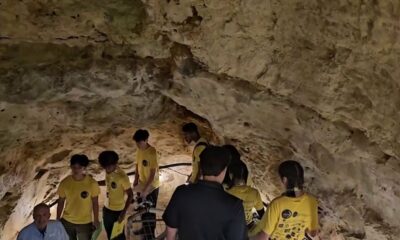News from the South - Arkansas News Feed
Arkansas Senate advances two stalled bills that would change citizen-led ballot initiative process
Arkansas Senate advances two stalled bills that would change citizen-led ballot initiative process
by Tess Vrbin, Arkansas Advocate
February 26, 2025
In a reversal, the Arkansas Senate allowed two proposed changes to the state’s citizen-led ballot measure process to advance to the House on Tuesday after failing to pass the bills’ emergency clauses earlier this month.
Sen. Kim Hammer, R-Benton, is sponsoring a slew of legislation he has said would deter fraudulent behavior and protect the integrity of the signature collection process for proposed ballot measures.
Opponents of the bills have called them a threat to the public’s right to change laws and the state Constitution, which fewer than half of states allow, according to the National Conference of State Legislatures.
Hammer announced in January that he will run next year for Secretary of State, the executive branch office that oversees elections.
Most of the bills he is sponsoring have emergency clauses, which would allow them to go into effect immediately upon Gov. Sarah Huckabee Sanders’ signature. Emergency clauses require a two-thirds vote of at least 24 senators and at least 67 House members.
The emergency clauses on Senate Bills 209 and 210 each received 24 votes Tuesday without any debate on the proposed laws themselves. The bills initially received 21 and 22 votes, respectively, on Feb. 12, and the emergency clauses again failed to reach 24 votes the following day.
Senate Bill 209 would disqualify signatures collected by canvassers if the secretary of state finds “by a preponderance of evidence” that they violated state law collecting the signatures.
Senate Bill 210 would require potential signers to read the ballot title of a petition or have it read aloud to them in the presence of a canvasser. It would also make it a misdemeanor for a canvasser to accept a signature from people who have not read the ballot title or had it read aloud to them in the presence of a canvasser.
Republican Sens. Jimmy Hickey of Texarkana, Clint Penzo of Springdale and Gary Stubblefield of Branch voted against both emergency clauses Tuesday. Sen. Bryan King, R-Green Forest, did not vote on either emergency clause. All four voted against the bills Feb. 12.
Sen. Tyler Dees, R-Siloam Springs, voted against SB 209 and for SB 210 on Feb. 12. He voted for both emergency clauses Feb. 13 and Tuesday.
Sen. Jim Petty, R-Van Buren, was absent Feb. 12 and did not vote on the emergency clauses Feb. 13. He voted for both emergency clauses Tuesday. Sen. Joshua Bryant, R-Rogers, was also absent Feb. 12 but voted for the emergency clauses twice.
All six Senate Democrats opposed SB 209 and SB 210.
The House Committee on State Agencies and Governmental Affairs will be next to hear the bills.
Amendments in committee
Hammer introduced a total of six bills earlier this month that would alter the ballot initiative petition process. Senate Bill 212 would create a law enforcement agency within the secretary of state’s office that could investigate the validity of submitted documents related to elections and ballot initiatives.
The bill failed in the Senate State Agencies Committee on Feb. 11. Hammer amended the bill and will present it to the committee again Thursday.
The Senate will vote Wednesday on another of Hammer’s bills, Senate Bill 207, which would require canvassers for ballot-measure petitions to inform potential signers that petition fraud is a criminal offense. The section of Arkansas code governing initiatives and referenda designates petition fraud a Class A misdemeanor.
Another section of Arkansas code designates petition fraud a Class D felony, which lawmakers pointed out during a Feb. 17 House State Agencies Committee hearing. House sponsor Rep. Kendon Underwood, R-Cave Springs, amended the bill to avoid confusion between the two statutes.
On Tuesday, the Senate State Agencies Committee voted to concur on the amendment to SB 207 and send it to the Senate floor.
Carol Egan, the only member of the public who testified in Tuesday’s committee meeting, said she opposed the bill because it would discourage participation in the ballot initiative process. She also questioned how it would be proven that someone violated the proposed law, noting that people opposed to a particular measure could derail it by saying that the canvasser hadn’t notified them that petition fraud is a criminal offense.
“I think this needs to be thought out a lot better, and I’m not even sure that it’s necessary,” Egan said.
The broadness of the term “criminal offense” allows prosecutors to apply a punishment appropriate to the crime, Hammer said.
“The applicable offense would be applied based on the severity of what they determined the person was doing,” he said. “So I think there’s a little bit of reason to keep it at the criminal offense level instead of making it something as harsh as a felony or as light as a misdemeanor.”
SB 207 passed the House Monday with 67 votes, the minimum required to pass the emergency clause. Seventeen of the 19 House Democrats, as well as nine Republicans, voted against SB 207.
GET THE MORNING HEADLINES.
House action and new laws
Two more of Hammer and Underwood’s ballot initiative bills passed the House Tuesday, with one needing a second vote to pass the emergency clause.
Senate Bill 208 would require canvassers to request a photo ID from potential signers, and Senate Bill 211 would require canvassers to file a “true affidavit” with the secretary of state certifying they complied with the Arkansas Constitution and state laws related to canvassing, perjury, forgery and fraudulent practices in the procurement of petition signatures. Signatures submitted without the affidavit would not be counted.
Both bills passed the House State Agencies Committee twice on split voice votes. The committee heard nearly six hours of public testimony, mostly in opposition, before passing the bills Feb. 17 but needed to pass them again Monday after they were amended.
SB 208 received 70 votes for and 24 votes against it after no debate on the House floor. Four House members did not vote and two voted present.
SB 211 received 65 votes for and 27 against, with five members not voting and three voting present.
All 19 House Democrats voted against SB 211. House Minority Leader Andrew Collins, D-Little Rock, was the only lawmaker to comment on the bill before the vote.
Collins pointed out that state law already requires ballot question committees to submit an affidavit identifying paid canvassers by name and provide proof that the committee explained to canvassers the state’s laws for soliciting signatures and gave them the Secretary of State’s initiatives and referenda handbook before they started canvassing.
He also said the possible disqualification of all signatures collected by the same person would disincentivize people from signing petitions in case the canvasser did not sign the additional affidavit.
“They may not have done anything wrong when it comes to getting your signature — your signature may be perfectly valid — but it’ll be thrown out if this bill passes if the canvasser has any issue, even [on] a technicality,” Collins said. “…Of all of the bills, this one really warrants a closer look because what we’re doing here is going to chill direct democracy, and the people’s voice matters in Arkansas.”
The emergency clause on SB 211 received 69 votes. Democratic Rep. Jessie McGruder of Marion switched his vote from no to yes, and Republican Reps. Rick McClure of Malvern and Ron McNair of Alpena switched their votes from present to yes.
Rep. Cindy Crawford, R-Fort Smith, did not vote on the bill and voted for the emergency clause. Rep. Cameron Cooper, R-Romance, voted present on both.
Also on Tuesday, Sanders signed two other bills co-sponsored by Hammer that alter the ballot initiative process:
Act 153 clarifies that the certification of ballot titles for initiatives, referenda and constitutional amendments as well as the signatures collected for those measures would only be valid for the next general election.Act 154 will expand the attorney general’s existing authority to reject a proposal if it conflicts with the U.S. Constitution or federal statutes. It will also prevent a sponsor from submitting more than one conflicting petition at the same time.
Act 153 has an emergency clause while Act 154 does not. Both bills went to Sanders’ desk last week.
YOU MAKE OUR WORK POSSIBLE.
Deputy Editor Antoinette Grajeda contributed to this article.
Arkansas Advocate is part of States Newsroom, a nonprofit news network supported by grants and a coalition of donors as a 501c(3) public charity. Arkansas Advocate maintains editorial independence. Contact Editor Sonny Albarado for questions: info@arkansasadvocate.com.
The post Arkansas Senate advances two stalled bills that would change citizen-led ballot initiative process appeared first on arkansasadvocate.com
News from the South - Arkansas News Feed
“We cannot hide anymore” Group protests in Springdale against immigration policies
SUMMARY: Hundreds of people protested in Springdale, Arkansas, calling for better recognition of immigrants and their contributions to the state. The protest was organized by a group aiming to challenge negative stereotypes of immigrants, particularly undocumented individuals. They argued that immigrants have significantly grown the economy and brought diversity to Arkansas. State Representative Aaron Pilkington acknowledged the value of legal immigrants but expressed concerns about the impact of illegal immigration on state resources. The protest also addressed issues at Tyson, where workers fear retaliation for speaking out. The march began at Murphy Park and ended at Luther George Park.

A group gathered in Springdale on Monday to speak out against immigration
Subscribe to 40/29 on YouTube now for more: http://bit.ly/PTElbK
Get more Northwest Arkansas news: http://www.4029tv.com
Like us: http://facebook.com/4029news
Follow us: http://twitter.com/4029news
Instagram: https://www.instagram.com/4029news/
News from the South - Arkansas News Feed
Trump to announce more tariffs on 'Liberation Day'
SUMMARY: President Trump has declared April 2nd as “Liberation Day,” during which he will announce new tariffs on imports from countries that tax American-made products. This initiative aims to support U.S. manufacturers; however, economists warn that American consumers may face increased prices. A 25% tax on imported vehicles and auto parts will begin Thursday, encouraging American car production. Trump officials predict the tariffs will generate over $6 trillion over the next decade, asserting that only companies will be affected. Despite a CBS News poll indicating that 72% of respondents expect price hikes, Trump remains unconcerned about potential consumer costs, emphasizing support for domestic manufacturing.

Trump has declared April 2 as “Liberation Day” saying that is the day he is going to put in new tariffs on countries around the world.
News from the South - Arkansas News Feed
Arkansas town hit hard by tornado making progress
by Ainsley Platt, Arkansas Advocate
March 31, 2025
Cave City was quiet last week.
The day after a high-end EF-3 tornado ripped through the small Sharp County town with 165-mile-per-hour winds on March 14, the main stretch had been abuzz with volunteers, heavy machinery and people sifting through what remained of their homes, businesses and storage units.
Fifteen tornadoes touched down in Arkansas during the March 14-15 severe weather event, according to the National Weather Service. Three people were killed in neighboring Independence County by the same tornado that devastated Cave City. That tornado was also the longest-tracked tornado in Arkansas since 2008, according to the weather service, remaining on the ground for over 80 miles — something the service noted as being “exceptionally rare” for a tornado in Arkansas.
Fast forward a week and a half, and the atmosphere in town has changed. Power lines no longer litter the sidewalk on one side of Main Street. People weren’t slowing in their cars, gawking and taking videos on their phones as they drove past the destruction. Cell service had been restored, even if it was somewhat spotty.
The cleanup had made remarkable progress, even after a week that began with a tornado and continued with whipping winds and fires that burned homes in an already-devastated area.
The remains of the town’s pharmacy — totalled by the tornado — are gone. Only a concrete pad and a small pile of rubble remain. The church and the grocery store are surrounded by fences, their roofs covered with tarps and sheet metal to keep out future rain. An excavator began tearing into a brick house next door to the grocery store, pulling down what remained of its roof.
Other than people operating heavy machinery — clearing debris and trees — not many people were walking around.
Irma Carrigan, who runs the Crystal River Cave Tours and Motel, said the day after the storm that she wasn’t convinced the hordes of volunteers and support that arrived in town after the storm would last. But on Wednesday, a week and a half after the tornado that totaled her car and pulled down a massive tree in her yard, crushing one of the many small buildings on her property, Carrigan said she’d been pleasantly surprised by just how much people wanted to help, noting that she hadn’t heard one complaint from those who had arrived to offer assistance.
“It has all been very positive, very caring people,” Carrington said. “They set up food centers for different places. We didn’t have to cook during all of that.”
“The volunteerism is just phenomenal,” Carrington said. Still, sometimes it could be overwhelming, she noted, being asked by volunteers how to help when those impacted themselves still weren’t sure.
“You just look ignorant to them because you’re just saying, ‘I don’t know,’” Carrington said.
The waves of volunteers ebbed about five days after the storm, Carrigan reported, but she was grateful for the help she got. A nonprofit brought in a crane, cut up the huge tree into chunks, and helped haul it onto a family friend’s truck. Some roofers reattached a part from her roof that had blown off in the storm.
Still, other things have been slow coming. Carrigan said that as of Wednesday, they were still being told they had to boil their water. Their internet only returned two days prior, and cell service wasn’t always reliable.
In the aftermath of the storm, sleep was sometimes hard to come by.
“Your brain won’t turn off,” Carrigan said. “I think mentally, you can’t shut it off. You’re still thinking, ‘What am I going to be doing tomorrow? What can I do?’ You just continue to pray that you’ll get guidance and where you need to go next.”
Walking down one of the roads that branched off from Main Street, Carrigan pointed to her neighbors’ houses. The white, two-story, former boarding house next to hers was the oldest in town, she said, and one of its occupants was on hospice. It was badly damaged.
Next door to it was a smaller house, the back of it torn open. Those neighbors, Carrigan said, were trapped under the rubble of their home for hours after the tornado hit. One of them was over 90 years old. She said she’d heard that the property had already been sold to someone else.
The yellow house even farther down was occupied by another elderly neighbor in their 90s, Carrigan reported. They planned to repair the damage, she’d heard.
Another neighbor will tear down and put in a mobile home, Carrigan said. Yet another told Carrigan they were considering a modular home.
“He said, ‘I’m too old to build. I’m too old to rebuild,’” Carrigan said of the neighbor who was considering a mobile home. “And he said, ‘I want something; I don’t want to wait two or three years to get it.’”
Some people were scared to even clean their windows until their insurance appraisers showed up, Carrigan said, leaving some in a state of limbo.
Carrigan expressed support for a federal disaster declaration, which Gov. Sarah Huckabee Sanders requested last week. Sander asked for additional federal help over the weekend.
“I would think they would,” Carrigan said of the federal government helping with disaster recovery. “I mean, I can’t imagine a disaster any worse.”
However, the Federal Emergency Management Agency, which normally manages federal disaster responses, is in the crosshairs of the Trump administration as one of its targets to be shut down, with the Washington Post reporting that Department of Homeland Security Secretary Kristi Noem expressed support for removing FEMA’s role in recovering from disasters by October.
It’s unclear how such an action would impact a federal disaster response in Arkansas if the declaration is approved. Stateline reported last month that disaster experts and states have said that they aren’t able to take on the role FEMA currently fills.
Carrigan wasn’t the only one who would like to see the disaster declaration approved. Brandi Schulz, the executive director of the Cave City Area Chamber of Commerce, said the money that would be available to both businesses and residents would help with the recovery.
“From a chamber director perspective, I know that (a federal disaster declaration) would open up some options for our businesses that were impacted,” Schulz said. “I know that there were going to be more options, supplemental options, outside of insurance if that does go through, so in that regard, I am hoping that we can get more assistance to our businesses and also to our residents.”
Schulz described Cave City as a “very DIY community,” and said that it, combined with the support of volunteers and donors, meant that the city would likely be in “a very good place” on debris removal within the next week. Roughly 59 people have been displaced by the tornado in the area, Schulz estimated.
Taking care of the physical needs of those who were affected doesn’t just mean helping clear debris, however. Schulz said the wife of the town’s fire chief, whom the chamber director said “specializes in trauma debriefing,” has been offering resources for the community.
“I think the biggest thing is people knowing that they’re not alone, that we’re here for them,” Schulz said. “And I think we’ve shown that in the last week or so.”
Carrigan expressed some frustration with communication from state and local authorities, even as she said she appreciated what they were doing and was satisfied with the rate at which cleanup and recovery had been happening. She heard that state money was available to those impacted to help with storm recovery, but wasn’t able to figure out how to apply. She said the Red Cross opened a shelter, only to close it 48 hours later.
“I went up to the Assembly of God to check out, try to find this Red Cross and they said, ‘Well, they were here, but nobody came up here to use their services,’” Carrigan said. “And I said, ‘Well, honey, nobody knew that they were here.’”
Schulz said local officials made efforts to reach people who weren’t able to get online information, at one point distributing fliers, she said.
The Red Cross confirmed it closed the shelter due to lack of use.
“We had some families that expressed interest, and then had found other places to say,” Red Cross regional spokesperson Sharon Watson said, adding that they had been coordinating with local faith leaders and town officials to get the word out. “Some had requested hotels, and we didn’t have hotel vouchers to offer because we had a shelter set up, and our shelter was available so therefore they opted to find other places to stay, which we completely understand.”
Watson noted that the shelter wasn’t the only way it was helping the community. On Thursday, the Red Cross opened several “Multi-Agency Resource Centers” in conjunction with the Arkansas Voluntary Organizations Active in Disaster for those affected by the tornado outbreak, designed to serve as a “one-stop shop” for residents to get answers from state and local authorities about disaster assistance.
The MARCs were open from Thursday to Sunday in different cities — Diaz on Thursday, Cave City on Friday, Melbourne on Saturday, and Pocahontas on Sunday.
Meanwhile, management of volunteers and donations was handed over to Eight Days of Hope, a Christian nonprofit, after being managed by local officials such as Schulz.
Gale Manning, the rapid response manager for the Cave City relief efforts, said the organization will be on the ground until April 5. Volunteers have been helping cut up and haul off trees, he said, to help make the area safer. He said roughly 70 to 80 people had been volunteering on the weekdays, with volunteers coming from as far away as Alaska.
“They’re devastated,” Manning said of the people who had been impacted by the storm. “They’ve lost their life savings, belongings. But, you know, as the days go on, they feel a bit better. Again, we share the gospel and we let them know that God’s in control and that he knows what’s going on, and he promised us all a better day.”
Arkansas Advocate is part of States Newsroom, a nonprofit news network supported by grants and a coalition of donors as a 501c(3) public charity. Arkansas Advocate maintains editorial independence. Contact Editor Sonny Albarado for questions: info@arkansasadvocate.com.
The post Arkansas town hit hard by tornado making progress appeared first on arkansasadvocate.com
-

 News from the South - Florida News Feed6 days ago
News from the South - Florida News Feed6 days agoFamily mourns death of 10-year-old Xavier Williams
-

 News from the South - Alabama News Feed7 days ago
News from the South - Alabama News Feed7 days ago1 Dead, Officer and Bystander Hurt in Shootout | March 25, 2025 | News 19 at 9 p.m.
-

 News from the South - Alabama News Feed5 days ago
News from the South - Alabama News Feed5 days agoSevere storms will impact Alabama this weekend. Damaging winds, hail, and a tornado threat are al…
-

 News from the South - Alabama News Feed4 days ago
News from the South - Alabama News Feed4 days agoUniversity of Alabama student detained by ICE moved to Louisiana
-

 News from the South - Louisiana News Feed6 days ago
News from the South - Louisiana News Feed6 days agoSeafood testers find Shreveport restaurants deceiving customers with foreign shrimp
-

 News from the South - Oklahoma News Feed3 days ago
News from the South - Oklahoma News Feed3 days agoTornado watch, severe thunderstorm warnings issued for Oklahoma
-

 News from the South - Oklahoma News Feed6 days ago
News from the South - Oklahoma News Feed6 days agoWhy are Oklahomans smelling smoke Wednesday morning?
-

 News from the South - West Virginia News Feed6 days ago
News from the South - West Virginia News Feed6 days agoRoane County Schools installing security film on windows to protect students








































